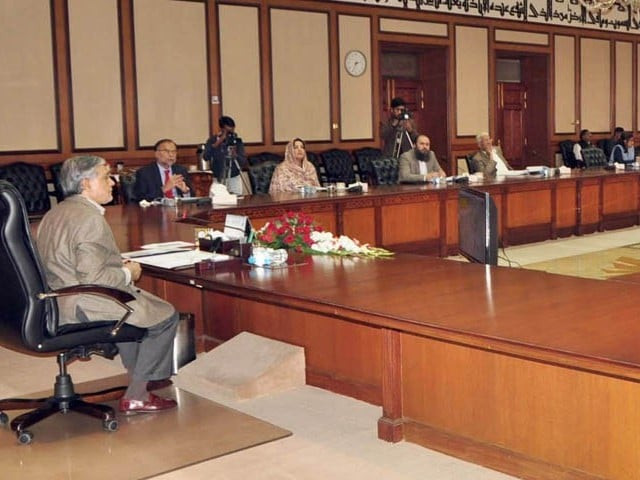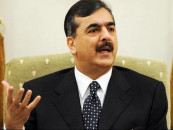Ecnec greenlights Islamabad Metro Bus project
Cost of the project will be shared by federal and Punjab governments.

Finance minister chairing the Ecnec meeting in Islamabad on Saturday. PHOTO: PID
The government on Saturday approved a multibillion-rupee metro bus project for Islamabad, just a day after the Supreme Court took suo motu notice of the scheme, fearing its adverse impact on the capital’s environment.
The Rs23.9 billion Islamabad Metro Bus Project was cleared in a meeting of the Executive Committee of the National Economic Council (Ecnec), which was specially convened on a weekly holiday at the Prime Minister’s Office. The meeting, which was chaired by Finance Minister Ishaq Dar, had a one-point agenda to discuss the Islamabad Metro Bus project.
Ecnec approved plans for the bus service in haste, without giving the Planning Commission (PC) time to conduct technical and financial appraisals of the project’s PC-1 – a document that contains details of a project’s cost and environmental impact, among other necessary information, PC officials told The Express Tribune.
Although the project was conceived along the lines of Lahore Metro Bus, its cost is comparatively high due to the latest revision in contract rates, finance ministry officials said.
The total cost will be shared by the federal and Punjab governments, with the former contributing Rs13.4 billion and the latter chipping in with Rs10.4 billion.
Ecnec also chose not to wait for a ‘no-objection certificate’ from the Environment Protection Agency (EPA) while greenlighting the project. According to a finance ministry statement, “the project has been approved subject to clearance of an environmental impact assessment (EIA) report by a competent authority.”

The Supreme Court has already taken suo motu notice of the project and has asked concerned authorities to explain whether the project poses any threat to the Islamabad Master Plan and the city’s green belts.
According to an official who attended Saturday’s meeting, the suo motu notice did not come up during discussions over the project. Ecnec members did, however, inquire about the EPA certificate and were told the agency had yet to issue it, he said.
Although the project will address Islamabad commuters’ woes to a large extent, it has been designed in haste – an issue which came up during discussion at the PC. Concerns that the route of the Islamabad Metro Bus will disrupt traffic at Jinnah Avenue have been unaddressed so far.
The planned bus service will start from IJ Principal Road at Faizabad, traverse through 9th Avenue and Jinnah Avenue, and terminate at Pakistan Secretariat. Trees along Jinnah Avenue will be cut down to facilitate the service and two lanes – one on each side of the thoroughfare – will be merged into the metro bus route, narrowing down the flow of traffic at one of the busiest roads leading to the Pakistan Secretariat.
Meanwhile, officials privy to developments said that the federal government will bear subsidies for the project to make it financially sustainable. Buses for the project will be arranged by the private sector, Ecnec members were told.
An official handout stated that the Metro Bus System would be a world-class facility for the residents of the twin cities. It added that the construction of long-awaited Peshawar Mor Interchange under this project will go a long way in addressing traffic congestion at the intersection.
Published in The Express Tribune, March 16th, 2014.



















COMMENTS
Comments are moderated and generally will be posted if they are on-topic and not abusive.
For more information, please see our Comments FAQ